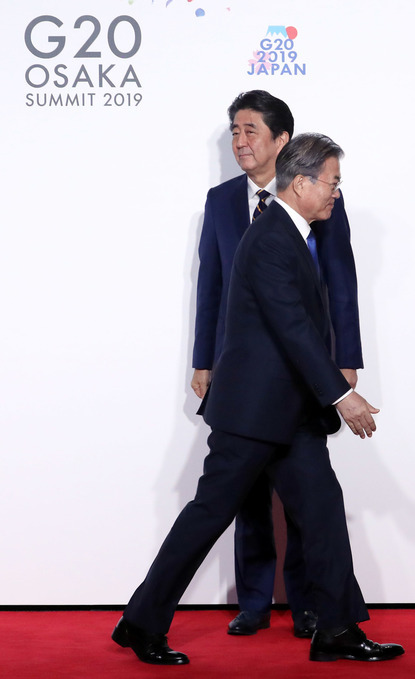 |
|
South Korean President Moon Jae-in passes by Japanese Prime Minister Shinzo Abe after their brief greeting at the G20 Osaka summit on June 28. (Yonhap News)
|
Semiconductors and displays highly dependent on Japan for materials
Chagrined South Korean businesses are scrambling to devise response measures to the Japanese government’s decision on July 1 to implement export regulations on three major types of South Korean semiconductor and display materials. In addition to being key industries for the South Korean economy, semiconductors and displays are also highly dependent on Japan for materials. Amid predictions of a heavy blow in the near future, some analysts are suggesting the development could end up being a boon for domestic businesses in the long term. For now, the response from South Korean semiconductor businesses such as Samsung Electronics and SK Hynix has been consternation. “The chemical materials used in the semiconductor process are difficult to store for long periods, so we only have a stock of about two to three months’ worth now,” an industry source said. “The Japanese government has said there will be a month-long hearing period, so our only option is to stockpile as much as possible in the meantime, and if it does go ahead we will need to work to minimize the vacuum in light of the approval procedures, which take three months at a time,” the source added. Another industry source said, “The semiconductor industry is a mainstay of the domestic economy, and the government has been moving proactively, so we plan to watch the situation closely as we decide how to respond.” Some analysts have suggested the situation may be an opportunity to use up stores amid recent oversupply conditions in memory semiconductors, while taking advantage of the difficulties with product supplies to increase price competitiveness. But in general, semiconductor businesses are viewing it as a crisis. Photoresist and etching gas, two of the materials for which the Japanese government announced export regulations, are essential components in the semiconductor manufacturing process. Fluorinated polyimides (FPIs) are used in the production of substrate polyimides for smartphones and are an essential component of flexible OLED and display panels. Japanese businesses account for 90% of South Korea’s FPI and photoresist production and 70% of etching gas – leaving businesses utterly dependent on Japan for supplies. Display businesses, including Samsung and LG Display, have also been nervously watching the trends. Chiefly used in small display products, FPIs are crucial for the foldable smartphones Samsung Electronics plans to launch later this year. LG Display reportedly does not use Japanese FPIs in any of its items currently in mass production. Analysts within the market predicted that the measures could end up having a negative impact on Japan’s own material industries and proving a boon for domestic material companies in the long term. “With Japan’s regulations, domestic material companies stand to enjoy reflexive gains as semiconductor manufacturers increase their use of domestically produced materials going ahead,” said Kim Yang-jae, an analyst for KTB Investment and Securities. Shares in Dongjin Semichem, a South Korean producer of semiconductor materials, traded at 11,850 won (US$10.15) on July 1, up by 17.91% from the previous trading day. On the domestic stock market, Samsung Electronics shares fell by 0.85% while SK Hynix shares rose by 0.72%. The numbers were seen as reflecting a mixture of factors including the export regulation announcement by Japan and the “truce” declared on June 29 in the US-China trade war. By Song Gyung-hwa, staff reporters Please direct comments or questions to [english@hani.co.kr]






